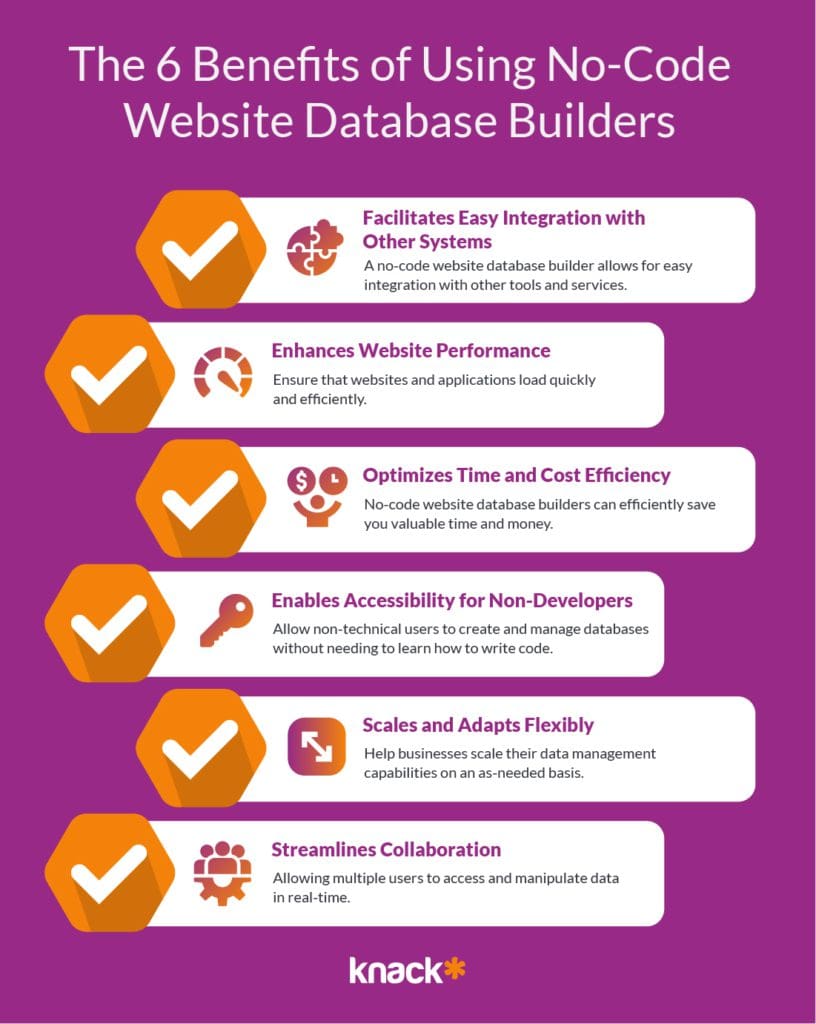Discovering the Benefits of Scalable Databases That Need No Coding Abilities for Effective Data Management Solutions
The development of scalable databases that eliminate the requirement for coding skills presents a transformative chance for organizations looking for effective information administration options. As we take into consideration the ramifications of such developments, it becomes important to take a look at exactly how they can improve the landscape of data management and drive lasting development in a competitive environment.
Enhanced Availability for Individuals
Improved accessibility for customers is an important facet of scalable data sources, ensuring that information management systems are straightforward and intuitive. In an era where data-driven choices are extremely important, access enables a bigger variety of users, consisting of those without extensive technical knowledge, to engage with database systems efficiently. This democratization of information access helps with enhanced collaboration across departments, encouraging employees to draw out understandings and make notified decisions.
Easy to use interfaces, such as visual information and drag-and-drop functions representation, streamline complex data interactions. These enhancements decrease the discovering curve connected with standard data source monitoring, enabling individuals to concentrate on leveraging data instead of facing technical intricacies. Scalable databases typically incorporate real-time analytics and customizable dashboards, supplying individuals with immediate understandings tailored to their particular demands.

Cost-Effectiveness and Source Savings
Efficient information monitoring not just depends upon access however also on cost-effectiveness and source financial savings. Scalable databases developed for users without coding skills substantially minimize monetary burdens typically related to standard data source management systems. By removing the demand for specialized shows know-how, organizations can assign their resources extra efficiently, focusing funds on core company activities instead of comprehensive training or employing competent employees.
Furthermore, these databases frequently utilize cloud-based options, which better lower expenses connected to hardware and upkeep. Organizations can scale their data source remedies according to their demands, staying clear of the expenditures sustained from over-provisioning sources. This versatility indicates organizations can adapt to changing demands without sustaining unneeded costs, leading to substantial lasting cost savings.
Additionally, easy to use user interfaces improve information entrance and management processes, reducing the moment spent on management jobs. This performance equates right into labor expense financial savings, permitting groups to concentrate on critical initiatives instead of routine upkeep. Generally, taking on scalable data sources that call for no coding abilities cultivates a much more cost-effective strategy to information administration, enabling organizations to optimize their sources while maintaining high levels of operational efficiency.
Improved Partnership Across Teams

Additionally, scalable databases facilitate smooth communication among staff member. With straightforward interfaces that require no coding abilities, staff members can conveniently create, customize, and share reports or control panels tailored to their specific requirements. This democratization of information encourages non-technical customers to add insights, improving the collective environment.
Additionally, these data sources support simultaneous access, allowing several individuals to work with the very same dataset at the same time. This function improves productivity, as teams can take part in joint data evaluation without the risk of version control problems. The capacity to leave remarks or notes straight within the database better promotes dialogue and clears up data analyses.
Streamlined Data Management Processes
In today's data-driven atmosphere, companies recognize the need of streamlined data administration processes to make the most of efficiency and accuracy. By leveraging scalable databases that need no coding skills, organizations can simplify their information handling and decrease the complexities generally related to typical database systems. This ease of access encourages non-technical individuals to engage straight with information, promoting quicker look at here now decision-making and minimizing reliance on specialized IT employees.
Structured data administration procedures enhance workflow by automating routine tasks such as information entry, recognition, and coverage. Automated information integration ensures that details from numerous sources is accumulated flawlessly, removing silos and promoting a merged sight of vital organization metrics (no-code). Furthermore, user-friendly interfaces enable employees to control information quickly, allowing them to generate understandings that drive tactical efforts without the need for considerable training.
This effectiveness not just increases functional processes but additionally minimizes the capacity for human mistake, ensuring that data remains precise and reputable. Ultimately, structured data management processes with scalable databases result in boosted productivity, permitting companies to concentrate on core tasks while making certain check my source that their data management methods are reliable and effective.
Scalability for Expanding Businesses

For expanding business, the ability to scale up or down is important. A scalable database can handle an influx of information generated from brand-new consumers, items, or services, ensuring that company operations remain uninterrupted. Furthermore, these data sources offer the ability to manage peak tons effectively, which is crucial throughout periods of quick growth or seasonal spikes.
In addition, several scalable database services are made with straightforward interfaces that require no coding abilities, equipping non-technical team to take care of data efficiently (no-code). This democratization of information management allows organizations to designate sources purposefully and lower dependence on specialized IT employees
Eventually, taking on a scalable data source not just improves operational effectiveness yet additionally promotes a setting where organizations can innovate and progress without the restrictions of traditional database systems. This versatility settings companies for long-term success in today's affordable landscape.
Conclusion
In verdict, scalable data sources that need no coding skills supply significant advantages for effective data monitoring. These systems improve ease of access for non-technical individuals, decrease functional expenses, and advertise collaboration throughout groups. By simplifying information administration procedures and using scalability for expanding organizations, such solutions make it possible for companies to adapt to altering needs successfully. Eventually, the fostering of these easy to use data sources promotes innovation and positions companies for long-lasting success in a vibrant atmosphere.
Improved availability for users is an index essential facet of scalable data sources, making certain that data monitoring systems are instinctive and straightforward.Easy to use interfaces, such as drag-and-drop functions and aesthetic information representation, streamline complex data communications. Overall, adopting scalable data sources that require no coding abilities promotes a more cost-effective approach to data management, enabling companies to optimize their sources while maintaining high degrees of operational performance.
By leveraging scalable databases that require no coding abilities, companies can streamline their data handling and lower the complexities typically connected with conventional data source systems - no-code.Streamlined data monitoring processes boost process by automating regular tasks such as information entry, recognition, and coverage